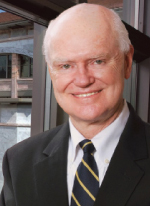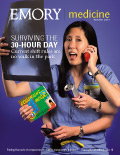A doctor's new year

Dean Thomas J. Lawley
This year is a special year for me. I am serving a one-year term as chair of the board of directors of the Association of American Medical Colleges (AAMC). The AAMC represents all 133 accredited U.S. and 17 accredited Canadian medical schools and 400 major teaching hospitals. That translates to 125,000 faculty members, 75,000 medical students, and 106,000 residents.
The AAMC is working on many important issues that affect you as a practicing physician and as a patient yourself. Three high profile areas are health care reform, increasing the number of doctors in the United States, and refining medical education.
How health care reform plays out is yet to be seen. Implementation of one of the biggest measures—the proposal to cover at least 20 million uninsured Americans through Medicaid in 2014—is uncertain. There are many players in this debate, and certainly no solution will satisfy everyone, but what is at stake is people’s access to health care. The AAMC has lent its expertise to inform the White House and Congress and will continue to advocate for health care coverage for all Americans.
No matter what version of health care reform is enacted, the shortage of doctors will grow. This country faces a short fall of more than 90,000 physicians by 2020 and only produces 27,000 new doctors each year. As many as one third of all practicing physicians may retire in the next 10 years. The AAMC continues to work with medical schools to increase access as one way to combat the shortage. Like many other medical schools, Emory has increased our enrollment about 15% over the past four years and will consider further expansion.
Medical school curriculums are being modified throughout the nation. While still appropriately emphasizing the basic sciences, there is increasing emphasis placed on patient experiences very early in medical school. Quality of care, patient safety, access to care, and empowerment of patients are all key elements of curriculum changes in many medical schools. I am proud to say that Emory embraced these issues and many more when we introduced our new curriculum four years ago.
Together we can continue to help steer the nation’s health care agenda and the dialogue on the issues affecting our future.
Sincerely,
Dean Thomas J. Lawley
Emory University School of Medicine


